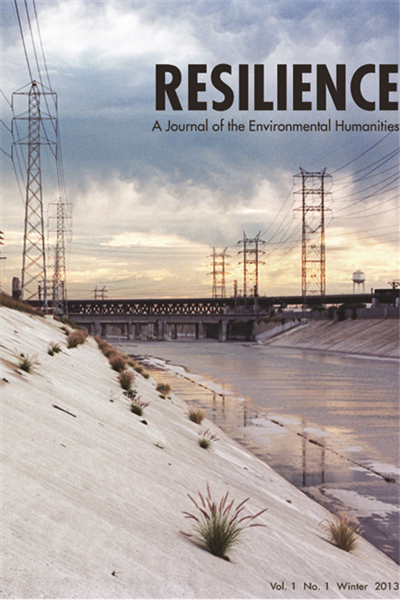The Green Avant-Garde: Food Hackers and Cyberagrarians (.pdf)
by Allison Carruth
From: Resilience: A Journal of the Environmental Humanities
Volume 2, Number 1, Winter 2014
pp. 48-65

…
ABSTRACT: Zack Denfeld and Cat Kramer are polymaths. Trained in design and versed in environmental policy, cultural theory, computer science, and molecular biology, this transatlantic duo cofounded the Center for Genomic Gastronomy (cgg ) in 2011 to explore “alternative culinary futures.” An interlocutor of both agribusiness and slow food, cgg cross-pollinates amateur science with multimedia art through built prototypes (such as the Spice Mix Super-Computer and the seed-o-matic vending machine) along with more speculative projects (for example, the little magazine Food Phreaking and the schematics for a hypothetical Community Meat Lab). Central to cgg’s work are interactive performances ranging from an Iron Chef–styled cooking competition, in which the main ingredient is in vitro meat, to the Planetary Sculpture Supper Club, whose unorthodox menus explore histories and possible futures of gastronomy.
Evident in the explanatory text for the Spice Mix Super-Computer, the organizing rubric of cgg’s eclectic project portfolio is that of biohacking: performative, often counterintuitive uses of biologically based technology to foster new public forums for social activism and experimentation. In the case of cgg , biohacking seems to aim pointedly at designing alternatives to the corporate and industrialized food industry. While “tactical media” and “bioart” are the terms critics have applied to such work, this essay argues that artists like Denfeld and Kramer are better understood as members of a new green avant-garde, one whose roots are in the historical modernisms of Dada, neo-Dada, and little theater. Along with cgg (based in Portland), leading figures of the green avant-garde include the Environmental Health Clinic + Lab (New York), Fallen Fruit (Los Angeles), Futurefarmers (Bay Area), Lindsay Kelley (Sydney and Bay Area), John O’Shea (Liverpool), Terreform one (Brooklyn), and the Tissue Culture and Art Project (Perth). Situating this contemporary movement in relation to the historical avant-garde bears fruit for both modernist studies and critical food studies. First, it highlights lacunae in earlier literary and artistic explorations of food and, moreover, underscores historical differences between avant-garde aesthetics and urban food cultures in both the early twentieth and the early twenty-first centuries. Second, and conversely, it invites scholars to investigate just how significant matters of taste and cultivation (as well as eating and farming) are to modernism writ large.
Scholars have begun to examine such alimentary matters in the texts of modernist and futurist writers, including Henry James, James Joyce, F. T. Marinetti, Lorine Niedecker, and Gertrude Stein. This recent scholarship suggests that such writers (with the notable exception of Niedecker) tend to foreground the culinary rather than the agricultural and, often, to bracket ecological concerns. As Cecilia Novero suggests in Antidiets of the Avant-Garde, futurist projects that center on eating render food conceptual and inedible. In the main, high modernist novelists like James and avant-garde figures like Stein dwell on the bodily and symbolic aspects of eating while eliding interconnections between consumption practices and what social scientists term food systems (which involve agricultural labor conditions, distribution infrastructure, and so on). By comparison, the members of the green avant-garde that this essay traces experiment with the cultural, technological, and ecological aspects of the edible world precisely to posit new food systems. To capture this endeavor, cgg has coined the term “cyberagrarianism” as a moniker for their work. The term invokes the agrarianism of US environmental writers like Wendell Berry who promote small-scale organic agriculture and community-supported agriculture (csa ), but it then displaces those writers…